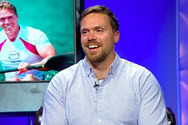Oral History
| Nom de l'objet : | Oral History |
| Catégorie de l'objet : | Documentary artifact |
| Matériaux : | Digita Video File |
| Numéro d'accession : | 2019.12.02 |
| Date de début de production : | 2019-02-03 |
| Date de fin de production : | 2019-02-03 |
| Description : | 26 minutes and 12 seconds of colour digital video footage with audio. Recording is of Bruce Rainnie interviewing Hall of Famer Mark De Jonge for the Legends of the Hall television program on Eastlink TV. .mp4 file, 1.96 gb. |
| Commentaires : | 025020319 Legends of the Hall: Mark de Jonge00:00 -01:50 - At age 13 he moved from Calgary to Halifax and his dad was always big into canoeing and camping so that's when he started paddling and was also to meet more kids. He kept going into faster boats which would get more tippy as they went 01:50 - 03:50 - His earliest memory of liking to compete would be just being the youngest of 5 children to just always be faster. He did Judo previously which also required a lot of strength. 03:50 - 05:25 - Maskwa is Halifaxs / Bedford's canoe club, he started in 1997, won two back National club championships in 2016 and 2017. 05:25 - 07:35 - Mark didnt compete until 1998 and was a bantam then, he became rivals with another local paddler, and they were always one and two. Being a Nova Scotian, he says you don't have time to be nervous because you race so much. He says he still gets nervous for races, but he's learned how to harness that energy. 07:35 08:45 - Bruce asks about the distance Mark became famous for racing (the 200m) and Mark continues to say how it existed everywhere but the Olympics until 2009. Thats when he can start to get funding for that race.08:45 Break on screen: Mark was recently named one of the Top 15 Athletes in Nova Scotia history. He was one of three paddlers on the list, the others being Karen Furneaux and Steve Giles 09:15 10:35 - Mark talks about how he was right on the cusp of making the 2004 and 2008 Olympics (with 500m and 1000m races), Bruce was saying how he is not only good at the 200m but also the other distances. In 2008 thats when Mark decided that there were other things he wanted to do, he started working, stepped away from racing slightly but still training, and competed at the 2009 World Championships.10:35 11:20 - When Mark found out about the 200m being added to the Olympics he decided in 2011 that if he wanted to make it to the 2012 Olympics, he would have to train full time, making it his priority.11:20 11:55 Plays video from Top 15 night11:55 -13:20 - Mark talks about how he graduated from Dal in 2009 with a civil engineering degree and started working full time at Stan Tec. He had to choose that or to paddle. He talks about putting his job in the back pocket so he could train. Mark talks about how close the races are and how people will actually tie because of how small the times are apart.13:20 15:50 - Mark says his fastest speed is about 6.5 m/s which is about low 20km/h. Mark couldnt explain the feeling of succeeding. He talks about it as a craving that he has. He also talks about one race in 2012 for qualifying for the Olympics and he had what he considered a perfect race and crossed the line in world record time.15:50 -17:00 - Mark talks about his training times being spread out between 2 or 3 workouts a day with about 3 to 4 hours a day. A lot of their time would be recovery and a lot of technical.17:00 18:40 - Talks about his bronze medal at the Olympics, he says he didnt have the best race for his final but he did beat the fourth place paddler by hundredths of a second.18:40 Break: on Screen- Mark graduated from Dalhousie University in 2009 with a degree in Civil Engineering19:20 -21:40 - Bruce asks Mark what he is doing now. Mark talks about how there is still potential for him for 2020 (Olympics). 2016 didnt work out very well for him, he was a world champion going in and was 7th place in the Olympic final. After Rio 2016 Olympics he took a year off, just had a baby with his wife, but still training just not as much. He then went back to continued training full time after his year off.21:40 24:00 - Bruce asks when paddlers hit their prime, Mark says late 20s early 30s. Mark talks about his challenges have changed with a baby son at home but he says he would have it no other way. Mark says the biggest part of his story would be having a technical background with engineering that he carried back into the sport. He says just digging into all the little problems.24:00 End - Mark talks about how he started making watches and designing them. He related that business to his paddling career. Closing remarks. |
| Fonctions : | Broadcast on Eastlink TV on February 3rd 2019. |
| Établissement : |
Nova Scotia Sport Hall of Fame
 Facebook-Nova Scotia Sport Hall of Fame Facebook-Nova Scotia Sport Hall of Fame
 Twitter-Nova Scotia Sport Hall of Fame Twitter-Nova Scotia Sport Hall of Fame
 YouTube-Nova Scotia Sport Hall of Fame YouTube-Nova Scotia Sport Hall of Fame
|
| Ville de l'établissement : | Halifax |
| Province de l'établissement : | Nova Scotia |
Coordonnées de cette page web
-
Pour proposer des corrections ou des mises à jour sur cette page, veuillez contacter directement le Réseau canadien d’information sur le patrimoine (RCIP).
